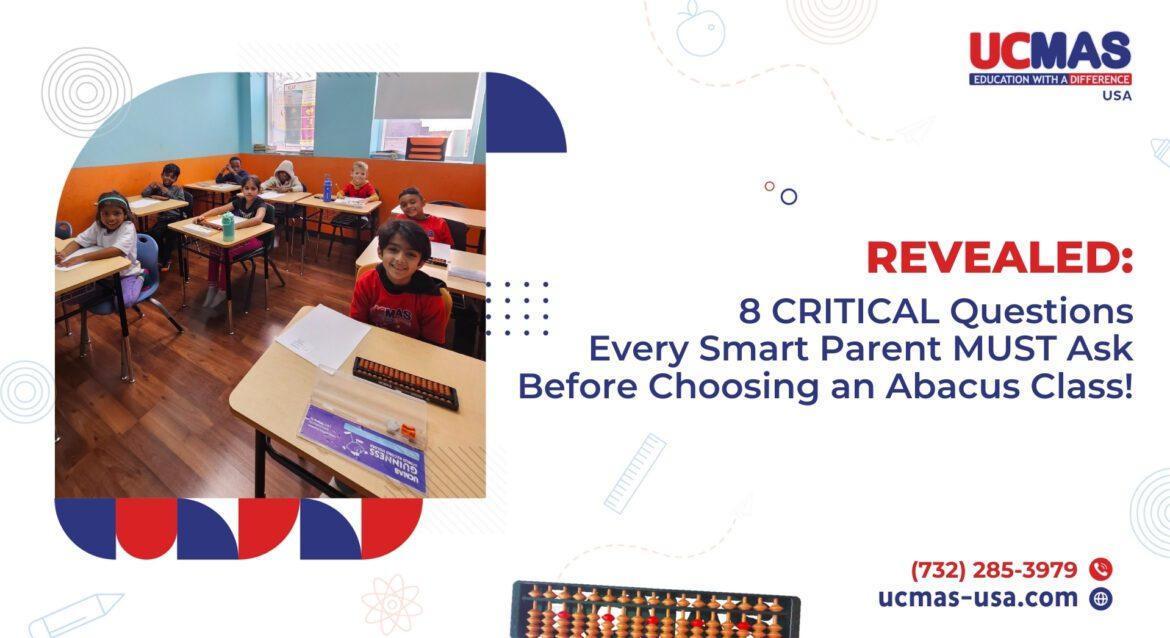As parents, we’re always seeking the best ways to give our children a competitive edge in learning. But what if there was a proven method that could supercharge their brainpower? Studies show that children who learn abacus can improve memory retention by 200% and perform mental calculations four times faster than their peers. These aren’t just numbers; they’re the kind of results that can shape a child’s confidence, problem-solving skills, and overall academic performance.
But with so many abacus programs available—both in-person and online—how do you know which one is right for your child? The wrong choice could mean wasted time, minimal progress, or even frustration. Asking the right questions before enrolling can make all the difference, ensuring your child gets the maximum benefit from their abacus learning journey.
In this blog, we’ll guide you through the key questions every parent should ask before choosing an abacus class so you can make an informed decision that truly supports your child’s growth.
1. What Is the Structure of the Abacus Program?
Before enrolling, ask about the structure of the program. A well-structured abacus math program should have clear levels, objectives, and a step-by-step approach that matches your child’s learning pace.
Programs like UCMAS Abacus Mental Math follow a systematic and scientifically designed curriculum. The program is structured across multiple levels, allowing students to gradually build their skills, starting with basic number recognition and abacus bead movement, and progressing to complex mental math techniques.
Key follow-up questions:
- How long does it take to complete each level?
- How is the progress of the child measured?
- Will my child get individual attention if they struggles at any point?
2. Is the Program Offered Online or In-Person?
Nowadays, parents have the flexibility to choose between abacus classes online and in-person centers. Depending on a child’s temperament, some children thrive in an in-person setting, while others may prefer learning from the comfort of their homes.
If you’re leaning towards virtual learning, find out if the classes are live, interactive, and designed specifically for online delivery. Look for online abacus classes that are engaging and interactive, with skilled instructors guiding students in real time. You can search online for the best online abacus class and get your child enrolled.
On the other hand, if your child learns better in a group setting, an in-person abacus class might be the better choice. Search for “abacus classes near me” to explore reputable learning centers in your area that offer structured, hands-on learning experiences.
Key follow-up questions:
- Are classes live or pre-recorded?
- How are students assessed in online and in-person classes?
- What technology or tools do they need at home for online classes?
3. What are the Qualifications of the Instructors?
The success of any program often comes down to the quality of the instructors. Experienced teachers can make learning fun, motivate students, and help them overcome challenges.

Before enrolling your child in an abacus math program, ask about the instructor’s training, experience, and teaching methods. Make sure that all the instructors are certified and trained in the abacus methodology, whether they teach in-person or online.
4. How Does the Program Measure Progress and Success?
As a parent, you want to see tangible results from your child’s learning journey. But how do you know if an abacus program is truly helping them improve? Whether you choose an online or in-person abacus class, it’s essential to understand how progress is tracked and measured.
Reputable programs provide structured assessments, ensuring your child is advancing at the right pace. Look for programs that offer report cards, level-based certifications, and milestone tracking to keep both you and your child motivated.
Additionally, top-tier abacus programs often encourage participation in competitions, such as the UCMAS Competition; that is held at national and international levels, where children can test their skills against peers. These events aren’t just about winning—they help build confidence, increase a child’s concentration, and provide a sense of achievement on a larger stage.
Key follow-up questions:
- Are there regular assessments or exams?
- Are there national and international opportunities for my child to compete in?
5. What are the Program’s Benefits Beyond Math Skills?
The abacus math program is more than just speed calculations. It’s about enhancing cognitive abilities like memory retention, problem-solving, and focus. Understanding these benefits can help you appreciate the long-term value of the program.

Choosing the right abacus class for your child is crucial, and the best way to do so is by understanding its holistic benefits before enrolling. To make an informed decision, here are some questions you must ask.
Key follow-up questions:
- How does the program help with my child’s overall brain development?
- Will these skills help my child in other subjects or activities?
- Are there testimonials or success stories I can review?
6. Is There a Trial Class or Demo Available?
It’s always a good idea to try before committing. Many abacus classes, both online and offline, offer free trial classes to help parents and children experience the teaching style and curriculum.
Look for a center that provides a no-obligation demo. This will allow you to gauge whether your child enjoys the class and is comfortable with the teacher’s approach.
Key follow-up questions:
- Is there a free demo or trial session?
- What materials are provided in the demo class?
- Will I be able to sit in and observe?
7. What Is the Class Size?
Class size can make a big difference, especially in skill-based programs like the abacus. Smaller classes usually mean more personalized attention and quicker problem resolution.
Ask about the institution’s student-to-teacher ratio and make sure it allows for meaningful interaction. Choose a program that keeps its classes small to ensure every child gets the attention they need to succeed.
Key follow-up questions:
- What’s the typical class size?
- How is individual attention ensured in group settings?
- Are there options for one-on-one sessions if needed?
8. What Is the Cost, and Are There Any Hidden Charges?
Finally, it’s essential to understand the cost involved. Some programs might have additional fees for materials, competitions, or exams.

Ask for a clear fee structure, and make sure you understand what’s included. Choose a program offering competitive pricing with transparent breakdowns for in-person and online abacus classes.
Key follow-up questions:
- What is included in the tuition fee?
- Do I need to pay extra for study materials, exams, and competitions?
- Is there a refund policy if my child can’t continue?
Still Wondering if Abacus Learning is Right for Your Child?
At UCMAS, we make learning math fun and rewarding with our unique abacus math program. Whether you choose online classes or in-person options, we’re here to support your child’s learning journey every step of the way.
Find a center near you or book a free demo class today and take the first step toward unlocking your child’s full potential!


